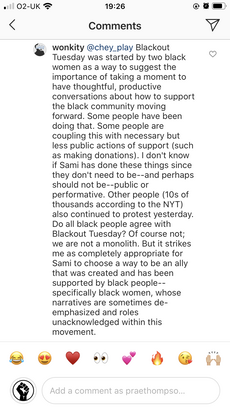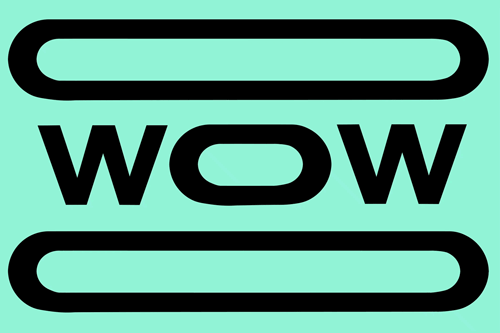 My screenshot of an Instagram comment left on Sami Clarke's post in response to criticism from another follower. My screenshot of an Instagram comment left on Sami Clarke's post in response to criticism from another follower. “If your actions are not ongoing. They are performative; they are not a practice” Annika Hansteen-Izora, Creative Director of Design and UI at Somewhere Good It has been two months since the death of George Floyd, and the social movement, known as Black Lives Matter, has regained a sense of heightened popularity as a result of this infamous horrific incident. I am White/Asian, and I’ve had conflicting feelings about whether it would be appropriate for me to speak about Black oppression because of how personal the subject is and because of my background. It almost feels selfish to share my sympathy publicly because I’ve done nothing in the past to help the cause. The little knowledge I possess on systemic racism contributes to the bigger problem, which is a privilege I’m ashamed of. The sudden pressure I feel to express my stance is obviously manifesting in many others as I see people sharing their thoughts on social media, but sympathy is not what is needed right now. With COVID-19 still a threat in today’s environment, people are finding different ways to show up, support, and be activists. Naturally, as a designer, I follow a lot of other designers and I’ve taken notice of the approaches of creative practices in protests and resistances developed by said artists and designers, protest groups, social movements and the general public. People have started posting black squares for #blackouttuesday, publicly stating their ally-ship, and sharing information they wouldn’t usually share relating to the movement. On Tuesday the 2nd of June, individual solid black squares flooded Instagram with the caption #blackouttuesday. There was no public holiday so I was confused at first but assumed it had something to do with the Black Lives Matter movement. After reading through some comments, I began to grasp the concept and posted a black square myself using the same caption. I thought maybe this was one way I could show that I care. The user @wonkity simplifies this in their comment, pictured on the right. Two women, Brianna Agyemang and Jamila Thomas, created the initiative with a motive to promote ‘thoughtful and productive conversations about how to support the black community moving forward.’ The user @wonkity also elaborates that although some people may not agree with this preformative ally-ship, this individual’s choice to show support should not be chastised as the initiative was created and supported by Black women. Graphic design is often criticised for encouraging clicktivism or slacktivism but @wonkity highlights the need to consider the other actions being taken by individuals. A post that appears to fall into the slacktivism category may in fact be an effective way to draw attention to good work being done and the desire to encourage other people to join in that work. This was something that resonated with me as it became clear that the discussion around showing support was more nuanced than, ‘Is the black square slacktivism or not?’. In reality, the truth lies in the motivation of the individual poster and the other actions they are taking to progress the cause. We also saw flaws in this initiative when people started to include #blacklivesmatter in their caption. It became counterproductive as it clogged up vital information normally shared using this hashtag. We then saw people actively combing through these posts and leaving comments urging people to remove this hashtag so that people looking can easily access information about the movement again. It highlighted the dangers of online initiatives because as the creators of the graphic images said in an interview with Billboard. That was never our intent, never any part of our directives. The goal was not to mute ourselves. The goal was to take a break from your daily nine-to-five duties to refocus and re-centre. (Agyemang, 2020) Perhaps, as allies, refocusing our intentions is more important than acting on impulse. As emotionally invested as we are right now, blindly navigating will take us in the wrong direction, and we saw this happen with #Theshowmustbepaused. By genuinely considering the purpose of our actions we can begin to phase out the preformative aspects which are often illusions of a solution. In the publication by Schessa Garbutt, Black Lives Matter is Not a Design Challenge., Garbutt discusses her frustrations about how designers have been using the movement as a trending PR opportunity. She explains how some efforts to support the cause can be unintentionally harmful and fundamentally selfish. Garbutt also lists resourceful examples of how fellow allies can redirect their energy in her publication. Reclaim your creativity. Your creativity is not legitimised by its ability to be profitable or shareable. (Garbutt, 2020) This may not be the case for every Black person but it is worth your consideration as an ally. I know people aren’t queuing around the corner to hear my thoughts on this but as a Eurasian woman, I think that I could be of value to people from both sides of my culture who may not understand. As I think about it on a superficial level, this virtue signalling comes off as impersonal and mimicy but the deeper I think about it, the more I am conflicted. These minimal collective efforts have kept the conversation going and the lingering effect it has will continue to give the social movement more time to do what it seeks. I take this as a sign that I probably need to educate myself some more before opening my mouth. By Prae Thompson References Garbutt, S. (2020) 'Black Lives Matter is Not a Design Challenge', Medium, June 2. Available at:https://medium.com/design-toast/black-lives-matter-is-not-a-design-challenge-f6e452ff7821 (Accessed: 8 July 2020). Schessa Garbutt (2020) Schessa Garbutt: Black Lives Matter is Not a Design Sprint. 22 June. Available at: https://vimeo.com/431480701 (Accessed: 8 July 2020). Agyemang B. and Thomas J. (2020) 'The Women Behind #TheShowMustBePaused - And What They're Planning Next'. Interviewed by G. Mitchell for Billboard, 11 June. Available at: https://www.billboard.com/articles/business/9399509/the-show-must-be-paused-founders-billboard-cover-story-interview-2020 (Accessed: 8 July 2020). Wong, H. (2020) 'Black Lives Matter: the designers using social media to protest', Design Week, June 9. Available at: https://www.designweek.co.uk/issues/8-14-june-2020/__trashed/ (Accessed: 9 July 2020).
0 Comments
Leave a Reply. |

